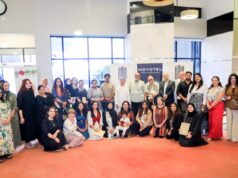Oh, to be more productive. It’s what we all want, right? In every office (and every social circle), there are those people who just seem to “get it done”—and get more done—faster than the rest. They leave work on time; they never forget to pick up dry-cleaning; they start (and finish) home projects; and they somehow still make it to the gym each day. Though we love to hate ’em for being so darn on top of everything, we want to be them—and are ever after their productivity secrets. How do they do what they do? We took it upon ourselves to answer that question by doing a little research into the top habits of highly productive people. Keep scrolling to get inspired!
each day. Though we love to hate ’em for being so darn on top of everything, we want to be them—and are ever after their productivity secrets. How do they do what they do? We took it upon ourselves to answer that question by doing a little research into the top habits of highly productive people. Keep scrolling to get inspired!
They Prioritise Prioritisation

PHOTO:kikki-k.com
Productive people know that no matter how exciting or unexciting a task is, it’s irrelevant: The reality of a task’s level of importance—not their preference for doing it—is what determines their workflow. The inherent nature of prioritisation is that to-do lists are created and ordered based on how soon something actually needs to get done, which is most often determined by external deadlines beyond our control (particularly in the work world). If something is due in the afternoon, it is more important to focus on it that morning than it is to spend an hour going through old emails you’ve been meaning to respond to, and would really like to get off your plate—but that aren’t actually tied to a hard deadline that day.
Sure, it would feel great to get the old, unanswered emails off your plate—and you’d quite frankly rather do that than the hard work you need to do—but that morning isn’t the time to get started when you have a real, pressing deadline for something else due. There are only so many hours in each and every day, and productive people know they have to ruthlessly prioritise what’s necessary to do.
People who procrastinate, on the other hand, pretty much do the exact opposite: Even if/when something is technically more important—and due sooner, than say, cleaning their room or organizing their shoe closet—they will spend time doing the less “immediately” important things to put off having to start the thing that is ultimately a bigger priority. Which leads to stress and inefficiencies.
In the morning, try making a to-do list of the very most essential things that need to be completed that day, in order of importance, not preference.
They Don’t Just Set Goals, They Assign Timelines

PHOTO:West Elm
A goal without a timeline is like a recipe without ingredients. It’s great to set goals for yourself, but they need to be broken down and assigned timelines for the various action items involved (like steps in a recipe) or the goal will seem insurmountable from the start, and won’t have any urgency attached to it. With a timeline, you’ll feel less lost and overwhelmed, and more driven to avoid distractions, while keeping your eyes on the prize.
They Set Limits

Burning the candle at both ends always ultimately leads to, well, burnout where you’re the opposite of productive. This is why productive people set limits that they adhere to. They let go of perfectionism on a daily basis, honoring the essential tenet of productivity that sometimes (if not all the time), things just need to get done (versus be perfect). In doing so, they avoid obsessive time traps, the kind where you realize, after it’s too late, that you’ve spent hours on a proposal (and maybe even skipped dinner or compromised sleep). Productive people look at the clock and tell themselves, “This needs to be done by 6 p.m.,” and then work their fastest and hardest to get it done, whether or not it’s the most perfect piece of work they’ve ever put forth. They work in sprints and pushes that have hard stops (i.e. “I will do as much on this proposal as I can within this hour”), to avoid getting burnt out on any one task or project (or work and life in general).
They Control Technology, Not the Other Way Around

PHOTO:
Rachael’s Notes
Productive people understand that it’s counterproductive to be a slave to technology. Not only will there always be something new and exciting to look at, social media can be a time-suck to even those with the most willpower. With limited time in a day, there’s simply no time to snap out of a daze in which you unintentionally spent an hour on Facebook. Productive people set aside time blocks—with hard and clear end times—to check and answer emails, or catch up on their Facebook feed, and then step away from the technology so that it doesn’t have the power to sneakily steal their time.
They Take Breaks Strategically

Many productive people force themselves to take a break, even for just three to five minutes, every 90 minutes or so. It prevents them from getting too caught up in the weeds of one thing, and provides a quick focus shift—a brain- and body-healthy breather. Stand up, stretch, go get some water (or refill your coffee cup), then sit back down and get back into it. You might find you’re far more productive than when you sit for extended periods of time only to let your mind wander and dilly-dally on things like, oh you know, Instagram.
They Don’t Multitask

Even with competing priorities, highly productive people focus on doing onething at a time really well, not switching back and forth between four things at once. Single-focus work is also the best way to gain momentum and celebrate small successes. When you’ve done one thing start to finish, you feel accomplished and propelled to tackle the next thing, also start to finish. On the other hand, when you’re working on four things at once, you never reap the mental reward and satisfaction of having fully completed something, and you’re also more likely to make mistakes and forget things as your brain goes back and forth amongst multiple areas.
They Make Sleep a TOP Priority

Not getting enough sleep is a guaranteed saboteur of productivity. The day after sleeping less than seven hours a night (let alone consecutive nights with less than seven hours of slumber), you’re slower, less focused, and less motivated. Studies have shown that even if you believe and think that you’re “just as productive” after a night of insufficient sleep, objective measures of brain activity and productivity show that you’re not. Humans are terrible judges of their own ability to perform cognitive tasks on little sleep, and overestimate how capable they are when running on little sleep.
Productive people know that sleeping the requisite minimum of seven hours a night is not a luxury, nor an option, but a necessity for living an optimally productive life. With this in mind, they organize their days and prioritize their work around getting into bed and waking up at a consistent time, so their minds and bodies function at peak ability.
Source: http://www.byrdie.stfi.re







